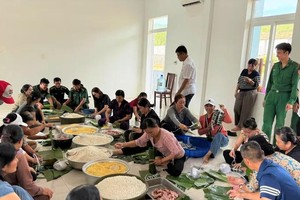
In its combination of self-reliance efforts, the national target program focused on sustainable poverty reduction, and innovative start-up models has provided impetus for ethnic minorities to improve their livelihoods and overcome poverty.
The Cu Jut District police in Dak Nong Province have helped connect hundreds of local workers with businesses, creating job opportunities in recent years. Thanks to that, people have stable jobs and their family economic condition has gradually developed. Lieutenant Colonel Nguyen Trung Huu, Chief of Cu Jut District police, said that through his work in the area, he realized that the ethnic minority area has a high poverty rate, with many residents lacking stable jobs and sufficient production materials.
Lieutenant Colonel Huu has directly connected with local businesses to solve the labor needs of the locality.
Thanks to these connections, hundreds of workers have received training and secured stable jobs. For example, a 29 year old woman in Cu Jut District previously struggled with unstable employment while caring for her elderly, non-working parents and three young children, making her family’s life extremely difficult. In 2022, Lieutenant Colonel Nguyen Trung Huu introduced her to a job at Duc Giang Company in Cu Jut District, providing her with a steady income.
Through diligent effort and developing her expertise, Ms. H Chen now earns a monthly salary exceeding VND12 million, stabilizing her family's financial situation. Additionally, Captain Nguyen Trung Hai of Cu Mgar District of Dak Lak Province Military Command implemented a program providing "fishing rods" to the impoverished, helping to improve the difficult circumstances of many local families.
Launching the program in 2016, up to now, Captain Nguyen Trung Hai has given dozens of pairs of breeding goats to poor households to help them develop their own economy. Thanks to the "fishing rod", many households have made efforts to earn money; as a result they have risen out of poverty. For example, Tuong Xuan Ung’s family in Ea Mdroh Commune, Cu Mgar District, received a pair of breeding goats from Captain Nguyen Trung Hai in 2018. Over time, their herd has grown to dozens of goats. By selling both commercial and breeding goats, Mr. Ung’s family has successfully escaped poverty.
In recent times, a series of poverty reduction projects from the National Target Program have been implemented in the Central Highlands provinces, especially in ethnic minority areas.
As a result, village conditions have improved, local economies have gradually developed, and the poverty rate has significantly declined.
Chairman Vo Trung Manh of the People's Committee of Tu Mo Rong District, Kon Tum Province, stated that the district has recently prioritized funding sources and national target programs to support the development of valuable medicinal herb gardens. Additionally, it has facilitated connections with reputable businesses to promote labor export and integrate locals into production chains. The district also focuses on preserving the culture of the Xo Dang ethnic people to enhance tourism.
As a result of cultivating 1,267 hectares of valuable medicinal herbs, many people have achieved financial stability and prosperity. From 2019 to 2021 alone, 1,761 households in Tu Mo Rong District managed to escape poverty, with 70 percent attributing their newfound economic success to the cultivation of medicinal herbs.
As reported by the Kon Tum Provincial Party Committee, in March 2024, the Provincial Party Standing Committee introduced Plan No. 133. This plan designates specific agencies and units to develop an effective mass mobilization model, aligned with the campaign aimed at transforming thought processes and working methods. The goal is to help ethnic minorities in villages achieve sustainable poverty alleviation.
Notably, the Provincial Party Committee assigned 58 agencies and units—including provincial departments, agencies and enterprises—to support 57 villages across eight communes in three districts such as Dak Glei, Kon Plong, and Tu Mo Rong. The implementation of Plan 133 aims to mobilize these organizations to effectively carry out skillful mass mobilization initiatives, helping residents change their production habits, achieve sustainable poverty reduction, and work toward prosperity.
Meanwhile, Party Secretary Dinh Van Dung of Chu Prong District, Gia Lai Province, stated that the district is prioritizing key initiatives, including leveraging resources from three national target programs to renovate mixed gardens, provide capital for businesses, promote vocational training, facilitate labor export, and create local job opportunities. Additionally, the district is focused on developing effective production models in ethnic minority areas to enhance economic growth.
At the same time, the locality also called on businesses and philanthropists to participate in supporting the elimination of dilapidated houses; create jobs to help each household have at least one worker, thereby escaping poverty sustainably. Thanks to the synchronous implementation of solutions, over the past time, the locality has reduced on average the number of poor households by 5 percent each year.
Elsewhere in the Central Highlands Province of Lam Dong, in recent years, thanks to investment capital from the National Target Program on Sustainable Poverty Reduction, along with local inhabitants’ efforts to develop the economy, thousands of households in remote communes and ethnic minority areas have risen out of poverty and stabilized their lives. Thanks to that, the rural landscape has increasingly improved.
The economy of ethnic minority and mountainous areas continues to grow remarkably, with poverty reduction goals achieving many clear results since the beginning of 2023. To date, there are 4,549 poor households in ethnic minority and mountainous areas in Lam Dong, accounting for 5.65 percent, a decrease of 2.9 percent compared to the end of 2021; there are 6,905 near-poor households, accounting for 8.57 percent.
Deputy Director Nguyen Tien Dung of the Department of Labor, Invalids, and Social Affairs of Lam Dong Province stated that the department continues to implement policies, programs, and projects aimed at sustainable poverty reduction by improving accessibility for beneficiaries and increasing participation among the poor. The province is particularly focused on encouraging impoverished communities, especially ethnic minorities, to rise out of poverty.
Additionally, the department collaborates closely with training institutions and businesses, actively involving companies—especially those capable of attracting workers through vocational training. This partnership extends from program development and training organization to job placement for graduates.
























